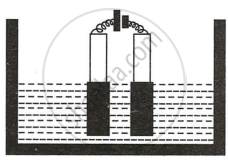Advertisements
Advertisements
Question
Give reasons why although copper is a good conductor of electricity, it is a non-electrolyte.
Solution
Copper has no mobile electrons in the solid state and an electrolyte should dissociate into oppositely charged ions to conduct electricity.
Hence, copper is a non-electrolyte.
APPEARS IN
RELATED QUESTIONS
State the observations at the anode and at the cathode during the electrolysis of fused lead bromide using graphite electrodes
Molten lead bromide conducts electricity. It is called an ______. It is composed of lead ______ and bromide ______. The lead ions are ______ charged and are called ______. The bromide ______ are ______ charged and are called ______.
Name a base which is a weak electrolyte.
How is the passage of electricity through an electrolyte different from the passage of electricity through a copper wire?
Write down the word or phrase from the given options that will correctly fill in the blanks in the following sentence:
Pure water consists entirely of ________
Why is carbon tetrachloride, which is a liquid, a non-electrolyte?
Aqueous solution of nickel sulphate contains \[\ce{Ni^{+2}}\] and \[\ce{SO^{-2}_{4}}\] ions.
- Which ion moves towards the cathode?
- What is the product at the anode?
Copper sulphate solution is electrolyzed using copper electrodes. Study the diagram given alongside and answer the questions that follow.

- Which electrode to your left or right is known as the oxidizing electrode and why?
- Write the equation representing the reaction that occurs.
- State two appropriate observations for the above electrolysis reactions.
Give appropriate scientific reasons for the following statement :
Zinc oxide can be reduced to zinc by using carbon monoxide, but aluminium oxide cannot be reduced by a reducing agent.
Copper sulphate solution is electrolysed using copper electrodes.
Write the equation for the reaction occurring at the Anode electrode.
